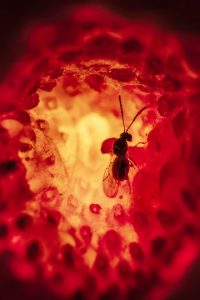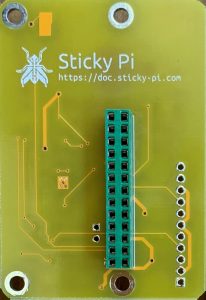Digital detection web for on-campus insects: Building community resilience in biodiversity monitoring

Leptopilina japonica inside a raspberry (Photo: Warren Wong)
March 4, 2022 – Tracking insects at UBC campus is taking a leap forward by employing high-tech, automated tools.
In a newly funded Campus as a Living Lab project led by Juli Carrillo, assistant professor in the faculty of land and food systems, remote sensing (affordable high-resolution optics), machine learning, and the Internet of Things will automate insect monitoring and aggregate large amounts of spatiotemporal data.
While agriculture is globally transitioning towards ‘precision’ through automation and digitization, e.g., using remote sensing, drone surveillance and Artificial Intelligence (AI) to monitor plant health, this type of monitoring for insects is still in its infancy. Entomologists typically capture insects using traps before manually enumerating and identifying specimens, which is extremely time-consuming and somewhat subjective.
This project will enable UBC to monitor insects in real-time, on a scale never done before, and, importantly, allow researchers to compare insect activity in natural habitats, urban campus landscapes, and the agricultural setting of UBC Farm.
As a citizen science initiative, UBC community members are invited to get involved. Dr. Carrillo’s research group has proposed a hackathon to help improve trap technology, and putting tools and resources in the hands of community members to allow ongoing monitoring and user feedback. This will strengthen connections between local food growers, community garden enthusiasts, researchers, and interested community members.
Why monitor insects? Tiny and ubiquitous, they are good indicators of global change in ecosystem services. Recent evidence suggests that some important insect groups may be declining while others proliferate, the consequences of which are already being felt in global food supplies, as outbreaks of pests and the overuse of inputs compound issues of land use, habitat loss, and climate change.

Sticky Pi Circuit Board
In a pilot program using Sticky Pi camera traps for digital detection of insects pests in agriculture, postdoctoral research fellow Quentin Geissmann (part of Dr. Carrillo’s research team), documented a new insect that has been listed as an urgent concern for Canada and affects trade policy with the U.S. Their group also detected limitations to current trapping technology that miss some classes of insects or underestimates insect populations.
This project allows researchers to create baseline data for UBC Campus and UBC Farm on insect biodiversity to improve future management decisions and monitor change. By creating real-time data for the public, UBC will serve as an early alert system for monitoring insects pests – these maps and pest alerts will be communicated to growers and other agricultural stakeholders across Canada.
To read about all the 2021 Campus as Living Lab projects, visit this webpage: https://sustain.ubc.ca/research/cll-fund-competition/award-recipients
Tagged with: 2022, Applied Biology, Awards, Centre for Sustainable Food Systems, UBC Farm